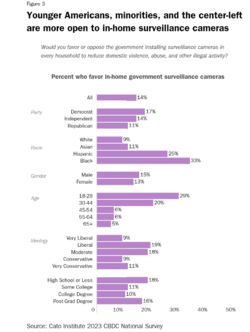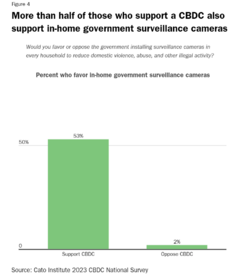Article | Archive
By Emily Ekins and Jordan Gygi
George Orwell’s 1984 is one of our society’s most frequently referenced illustrations of what life would be like under an authoritarian government. Actual government policies that are viewed as illiberal in varying degrees are often tied to this novel by opponents, an easy and effective way to call out government overreach and control. In the book 1984, citizens of the fictional nation Oceania are under constant government surveillance, including in their own homes. Devices called telescreens display propaganda and record peoples’ actions, allowing the government to monitor people even in what should be the most private place they know—their homes. This type of behavior is meant to be an extreme example of what can happen when a government gains too much power, and opposition to such surveillance has been assumed to be overwhelming and obvious. But is it?
In a newly released Cato Institute 2023 Central Bank Digital Currency National Survey of 2,000 Americans, we asked respondents whether they “favor or oppose the government installing surveillance cameras in every household to reduce domestic violence, abuse, and other illegal activity.” Not surprisingly, few Americans—only 14 percent—support this idea. Three‐fourths (75 percent) would oppose government surveillance cameras in homes, including 68 percent who “strongly oppose,” while 10% don’t have an opinion either way.

However, Americans under the age of 30 stand out when it comes to 1984‐style in‐home government surveillance cameras. 3 in 10 (29 percent) Americans under 30 favor “the government installing surveillance cameras in every household” in order to “reduce domestic violence, abuse, and other illegal activity.” Support declines with age, dropping to 20 percent among 30–44 year olds and dropping considerably to 6 percent among those over the age of 45.

We don’t know how much of this preference for security over privacy or freedom is something unique to this generation (a cohort effect) or simply the result of youth (age effect). However, there is reason to think part of this is generational. Americans over age 45 have vastly different attitudes on in‐home surveillance cameras than those who are younger. These Americans were born in or before 1978. Thus the very youngest were at least 11 before the Berlin Wall fell. Being raised during the Cold War amidst regular news reports of the Soviet Union surveilling their own people may have demonstrated to Americans the dangers of giving the government too much power to monitor people. Young people today are less exposed to these types of examples and thus less aware of the dangers of expansive government power.
It is also possible that increased support for government surveillance among the young has common roots with what Greg Lukianoff and Jonathan Haidt describe in the Coddling of the American Mind: young people seem more willing to prioritize safety (from possible violence or hurtful words) over ensuring robust freedom (from government surveillance or to speak freely).

Other demographics also differ in their tolerance of government surveillance in their homes. African Americans (33 percent) and Hispanic Americans (25 percent) are more likely than White Americans (9 percent) and Asian Americans (11 percent) to support in‐home government surveillance. Democrats (17 percent) are also more likely than Republicans (11 percent) to support it but not by a wide margin. This issue divides Democrats between those who identify as “very liberal” in which only 9 percent support and “liberal” who are more than twice as likely to support (19 percent). Notably the issue doesn’t divide men (15 percent) and women (13 percent) who were about equally likely to support.
We asked this question as part of our survey on Central Bank Digital Currencies (CBDCs) in order to see whether there is a relationship between opinions on the government issuing a central bank digital currency and government installing cameras in homes. It appears that the two opinions are correlated. Interestingly, more than half (53 percent) of those who support the United States adopting a CBDC are also supportive of government surveillance cameras in homes, while only 2 percent of those who oppose a CBDC feel the same. This suggests there may be a common consideration that is prompted by both issues. Likely, it has to do with willingness to give up privacy in hopes of greater security.

It is important to emphasize that the overwhelming majority of Americans across demographic groups oppose the government surveilling people in their homes. Nevertheless, it is relevant to note the higher acceptance among younger generations to trade freedom and privacy for some added security and protection.
If these trends continue, the United States may confront a very different privacy landscape in the future. It is possible that at some point, the American public will be open to extreme government overreach in a world that feels scarier and more dangerous than before, whether or not it is. Thus, it is important to impart the learnings of the past (and present) about what can happen when government amasses too much power. Without explicitly telling younger generations about the risks and dangers of government surveillance they will forget these lessons and may find themselves repeating devastating mistakes of the past.
By Emily Ekins and Jordan Gygi
George Orwell’s 1984 is one of our society’s most frequently referenced illustrations of what life would be like under an authoritarian government. Actual government policies that are viewed as illiberal in varying degrees are often tied to this novel by opponents, an easy and effective way to call out government overreach and control. In the book 1984, citizens of the fictional nation Oceania are under constant government surveillance, including in their own homes. Devices called telescreens display propaganda and record peoples’ actions, allowing the government to monitor people even in what should be the most private place they know—their homes. This type of behavior is meant to be an extreme example of what can happen when a government gains too much power, and opposition to such surveillance has been assumed to be overwhelming and obvious. But is it?
In a newly released Cato Institute 2023 Central Bank Digital Currency National Survey of 2,000 Americans, we asked respondents whether they “favor or oppose the government installing surveillance cameras in every household to reduce domestic violence, abuse, and other illegal activity.” Not surprisingly, few Americans—only 14 percent—support this idea. Three‐fourths (75 percent) would oppose government surveillance cameras in homes, including 68 percent who “strongly oppose,” while 10% don’t have an opinion either way.

However, Americans under the age of 30 stand out when it comes to 1984‐style in‐home government surveillance cameras. 3 in 10 (29 percent) Americans under 30 favor “the government installing surveillance cameras in every household” in order to “reduce domestic violence, abuse, and other illegal activity.” Support declines with age, dropping to 20 percent among 30–44 year olds and dropping considerably to 6 percent among those over the age of 45.

We don’t know how much of this preference for security over privacy or freedom is something unique to this generation (a cohort effect) or simply the result of youth (age effect). However, there is reason to think part of this is generational. Americans over age 45 have vastly different attitudes on in‐home surveillance cameras than those who are younger. These Americans were born in or before 1978. Thus the very youngest were at least 11 before the Berlin Wall fell. Being raised during the Cold War amidst regular news reports of the Soviet Union surveilling their own people may have demonstrated to Americans the dangers of giving the government too much power to monitor people. Young people today are less exposed to these types of examples and thus less aware of the dangers of expansive government power.
It is also possible that increased support for government surveillance among the young has common roots with what Greg Lukianoff and Jonathan Haidt describe in the Coddling of the American Mind: young people seem more willing to prioritize safety (from possible violence or hurtful words) over ensuring robust freedom (from government surveillance or to speak freely).

Other demographics also differ in their tolerance of government surveillance in their homes. African Americans (33 percent) and Hispanic Americans (25 percent) are more likely than White Americans (9 percent) and Asian Americans (11 percent) to support in‐home government surveillance. Democrats (17 percent) are also more likely than Republicans (11 percent) to support it but not by a wide margin. This issue divides Democrats between those who identify as “very liberal” in which only 9 percent support and “liberal” who are more than twice as likely to support (19 percent). Notably the issue doesn’t divide men (15 percent) and women (13 percent) who were about equally likely to support.
We asked this question as part of our survey on Central Bank Digital Currencies (CBDCs) in order to see whether there is a relationship between opinions on the government issuing a central bank digital currency and government installing cameras in homes. It appears that the two opinions are correlated. Interestingly, more than half (53 percent) of those who support the United States adopting a CBDC are also supportive of government surveillance cameras in homes, while only 2 percent of those who oppose a CBDC feel the same. This suggests there may be a common consideration that is prompted by both issues. Likely, it has to do with willingness to give up privacy in hopes of greater security.

It is important to emphasize that the overwhelming majority of Americans across demographic groups oppose the government surveilling people in their homes. Nevertheless, it is relevant to note the higher acceptance among younger generations to trade freedom and privacy for some added security and protection.
If these trends continue, the United States may confront a very different privacy landscape in the future. It is possible that at some point, the American public will be open to extreme government overreach in a world that feels scarier and more dangerous than before, whether or not it is. Thus, it is important to impart the learnings of the past (and present) about what can happen when government amasses too much power. Without explicitly telling younger generations about the risks and dangers of government surveillance they will forget these lessons and may find themselves repeating devastating mistakes of the past.